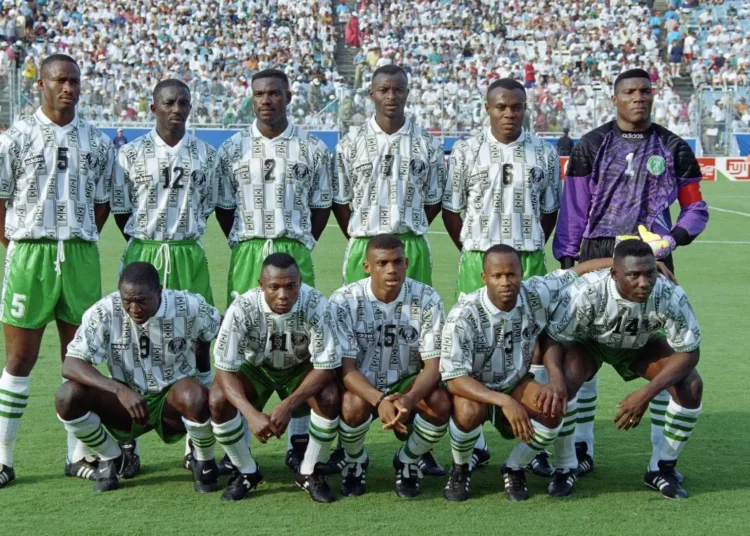Take a second look at these photographs. They once wore green and white national colour with the pride of warriors. Their sweat stained the nation’s colours, their goals lifted millions to their feet.
In 1994, they gave Nigeria its golden football moment. A triumphant Africa Cup of Nations win and a first-ever World Cup appearance that made the world finally take notice.
They gave us everything. But what did we give them in return?
Today, six of those heroes are gone. And worse still, many of them died in pain, in silence, and in neglect. Not in stadiums to roaring fans, but in hospital beds, on lonely streets, and in the quiet corners of countries far from home.
These were not just footballers. They were symbols of national pride. They were brothers, captains, sons of the soil. Men like Rashidi Yekini, who roared into the net and into history. Thompson Oliha, the midfield maestro with fire in his boots. Stephen Keshi, the ‘Big Boss’ who led like a general. Wilfred Agbonavbare, the quiet backup who played with grace. Uche Okafor, steady in defence and strong in heart. And now, Peter Rufai, Dodo Mayana himself, a royal who gave up a crown to chase the ball for Nigeria.
As far as Nigeria is concerned ,these legends lifted the spirit of a struggling nation in the school of football. But when their own strength failed, where was Nigeria?
Their Names Deserve More Than Statues:

Peter Rufai (1963–2025)
The most recent loss is Rufai. As we are all aware, he was more than a goalkeeper. He was a leader, a prince, and a symbol of calm under pressure. He died on July 3, 2025, after a brief illness in Lagos, aged 61. His choice to wear the national colours instead of royal robes remains one of Nigerian football’s most romantic stories. He played at both USA ’94 and France ’98, captained the Eagles, and was instrumental in Nigeria’s AFCON win.
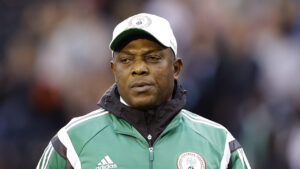
Stephen Keshi a.k.a CR3 (1962–2016). Captain, Coach, and Champion. Keshi not only led the 1994 team as captain, but also coached Nigeria to the 2013 AFCON victory. He was the second person ever to win the tournament as both player and manager. His death in 2016 from cardiac arrest was a painful blow. Keshi had always been outspoken about the need for respect and reform in Nigerian football , but sadly, not enough people listened.
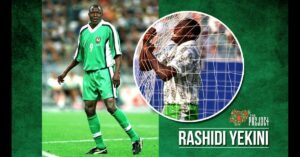
Rashidi Yekini (1963–2012)
Who can forget his unforgettable celebration, clutching the net and screaming with pure joy after scoring Nigeria’s first-ever World Cup goal in 1994? Yet behind that iconic image was a man who later battled isolation and depression. He died in 2012, aged just 48, under tragic circumstances that still stir questions. Nigeria lost not just its greatest striker, but also a man whose pain went unheard.
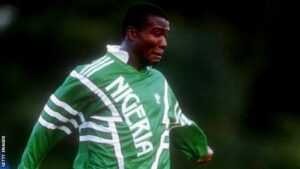
Thompson Oliha (1968–2013)
An engine in midfield, Oliha’s career was cut short early by injury, but his influence on the team was undeniable. He died at 44 in Ilorin, from complications related to malaria. His was a quiet death that didn’t make many headlines, yet he was one of the true souls of that golden squad.
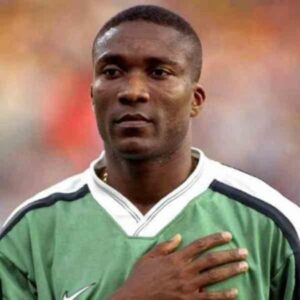
Uche Okafor (1967–2011)
A rock in defence and a gentleman off the pitch, Uche’s sudden death in Dallas, USA, shocked many. Officially ruled a suicide, his family and friends have long challenged the story, calling for deeper investigation. His was a death that still casts a long, uncomfortable shadow.
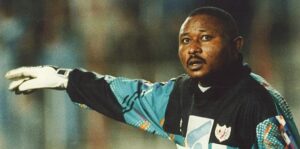
Wilfred Agbonavbare (1966–2015)
A lesser-known name but a vital member of the team. Agbonavbare was the backup keeper to Rufai at USA ’94. After retiring, he worked odd jobs in Spain and quietly battled cancer until his death in 2015. His plight received little national attention—he died far from home, nearly forgotten.
They Built Our Dreams But Died Quietly:
What binds these six men isn’t just the green they once wore
It’s the quiet way they exited. No national honours. No pensions. No long-term care. Some died with broken bodies, others with broken spirits. But all deserved more.
LEADERSHIP Sunday writes that this is not a eulogy. This is a reckoning.
We remember them not just for their goals and saves, but for their sacrifice. They gave us joy, pride, and belief. Now, it’s our turn to give back, even if all that’s left is memory.
There’s a growing consensus that Rufai and the other five others , deserved better care, greater appreciation during his life, and sustained support for sporting veterans.
Political Tributes:
President Bola Ahmed Tinubu, through his official spokesman, paid tribute to Peter Rufai, describing him as “a patriotic sportsman who wrote his name in gold.” The President praised Rufai’s outstanding contributions to Nigerian football, particularly highlighting his pivotal role in the country’s historic 1994 Africa Cup of Nations (AFCON) triumph and its debut appearance at the FIFA World Cup the same year.
He extended condolences to Rufai’s family, the Nigerian football community, and the entire nation, calling his death a great loss to Nigerian sports.
Former Vice President Atiku Abubakar joined in mourning the passing of Peter Rufai, describing it as a “profound loss to the global football community.” He extended heartfelt condolences to Rufai’s family, friends, and fans, acknowledging the legendary goalkeeper’s remarkable contributions to Nigerian and international football. Atiku praised Rufai’s dedication, sportsmanship, and the pride he brought to the nation during his illustrious career.
Former presidential candidate and former governor of Anambra State, Peter Obi, expressed deep sadness over the loss of the legendary goalkeeper. Describing Peter Rufai as “unarguably one of Nigeria’s finest goalkeepers,.”
Obi highlighted the unforgettable memories Rufai created for the nation during the 1994 Africa Cup of Nations and Nigeria’s first-ever FIFA World Cup appearance. He extended his heartfelt condolences to the family, football community, and all Nigerians, noting that Rufai’s legacy would continue to inspire generations to come.
Tributes From On-Field Legends:
Ahmed Musa, current Super Eagles skipper, took to X to write:
“Can’t believe I’m typing this … a true giant of Nigerian football… Fly high, DODOMAYANA — the nation mourns a hero.”
Mutiu Adepoju, Rufai’s former midfield teammate, shared heartfelt grief:
He said, “We have lost a colleague, a brother, and an African legend, Peter Rufai… Journey well and may your legacy continue to inspire generations to come.”
Friday Ekpo, another former Eagle, reflected on Rufai’s warm spirit: “He wasn’t just a teammate—he was more like a brother… we will miss him a lot.”
Emmanuel Amuneke emphasised Rufai’s selfless national service and urged better post-career support: “Death is something no one can avoid… but this came too soon.” He also echoed calls to honour sporting legends while alive.
Public Response:
The Nigeria Football Federation (NFF) paid tribute, calling him “A giant of Nigerian football and lamenting that “we didn’t even know he had been ill.”
The National Sports Commission described Rufai as “a rare soul whose humility, strength, and passion inspired all of us”.
Criticism Over Welfare, Recognition:
Etim Esin, Rufai’s former teammate, criticised the government’s neglect of football legends: What sickness couldn’t have been diagnosed and treated?… It shouldn’t be until someone dies that we celebrate and remember them.”
Comedian Bovi Ugboma echoed this concern, noting: “National heroes… often pass away quietly, uncelebrated and largely forgotten by the systems they gave their all to.”
FIFA President , Gianni Infantino, recognised the tragedy, offering condolences and highlighting Rufai’s global influence.
Everyday Nigerians share personal memories online, This is even as some students recalled meeting Rufai at YabaTech in 2019, while fans celebrated his iconic nickname and legendary saves
LEADERSHIP Sunday prayer that , “May the golden generation never be forgotten. May their stories be told long after the cheers have faded.


